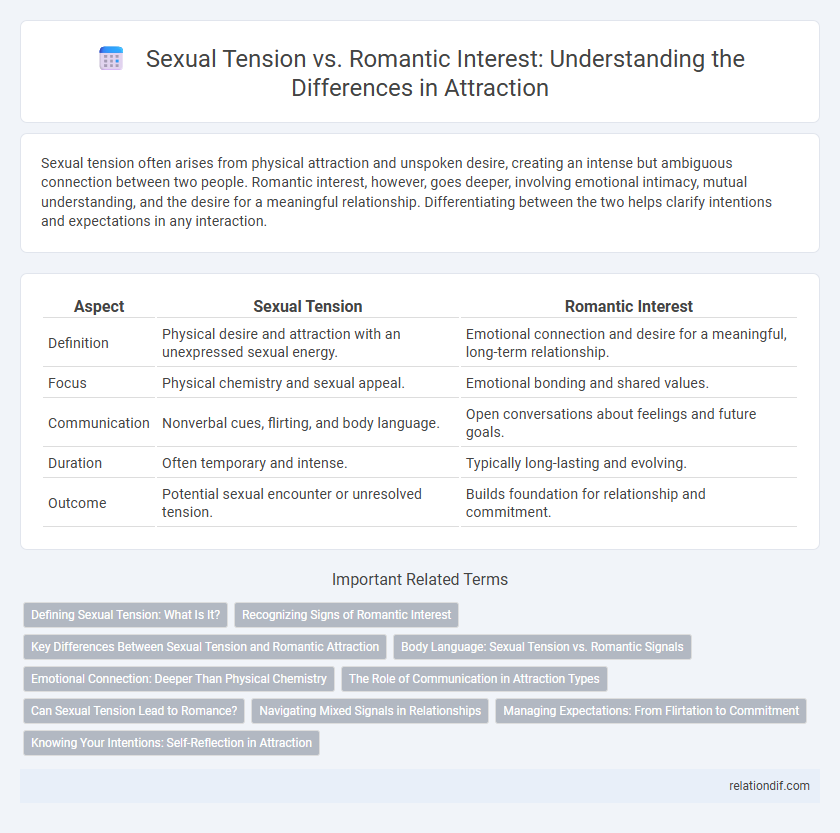Sexual tension often arises from physical attraction and unspoken desire, creating an intense but ambiguous connection between two people. Romantic interest, however, goes deeper, involving emotional intimacy, mutual understanding, and the desire for a meaningful relationship. Differentiating between the two helps clarify intentions and expectations in any interaction.
Table of Comparison
| Aspect | Sexual Tension | Romantic Interest |
|---|---|---|
| Definition | Physical desire and attraction with an unexpressed sexual energy. | Emotional connection and desire for a meaningful, long-term relationship. |
| Focus | Physical chemistry and sexual appeal. | Emotional bonding and shared values. |
| Communication | Nonverbal cues, flirting, and body language. | Open conversations about feelings and future goals. |
| Duration | Often temporary and intense. | Typically long-lasting and evolving. |
| Outcome | Potential sexual encounter or unresolved tension. | Builds foundation for relationship and commitment. |
Defining Sexual Tension: What Is It?
Sexual tension is the palpable, charged energy between two individuals driven by mutual physical attraction without explicit expression or fulfillment. It often manifests through lingering glances, subtle touches, and heightened body language, creating an anticipatory dynamic that stimulates desire. Unlike romantic interest, sexual tension remains primarily physical and unspoken, focusing on chemistry and attraction rather than emotional connection or long-term commitment.
Recognizing Signs of Romantic Interest
Recognizing signs of romantic interest involves noticing consistent eye contact, genuine smiles, and open body language that indicate emotional connection beyond physical attraction. Verbal cues such as personalized compliments, deep, engaging conversations, and expressions of care highlight a desire for emotional intimacy rather than mere sexual tension. Active efforts to spend quality time together and remember small details about each other underscore a budding romantic interest that transcends physical desire.
Key Differences Between Sexual Tension and Romantic Attraction
Sexual tension primarily involves physical desire and anticipation without immediate gratification, often characterized by intense eye contact, flirtation, and nervous energy. Romantic attraction encompasses emotional connection, affection, and a desire for a deeper, long-term relationship beyond physical interest. Key differences include the presence of emotional intimacy and commitment in romantic attraction, whereas sexual tension is more transient and centered on physical chemistry.
Body Language: Sexual Tension vs. Romantic Signals
Sexual tension often manifests through subtle, lingering touches, intensified eye contact, and mirroring of body movements that signal physical attraction and desire. Romantic signals, however, are characterized by softer gestures such as gentle hand-holding, prolonged smiles, and open body posture, indicating emotional connection and affection. Understanding these nuanced body language cues helps distinguish between immediate physical chemistry and deeper romantic interest.
Emotional Connection: Deeper Than Physical Chemistry
Sexual tension heightens physical chemistry through intense attraction and unspoken desire, yet romantic interest fosters a profound emotional connection that transcends mere physicality. Emotional bonding involves shared values, trust, and vulnerability, creating a foundation for lasting intimacy beyond fleeting passion. This deeper connection differentiates casual allure from meaningful romantic involvement, enriching the experience with empathy and mutual understanding.
The Role of Communication in Attraction Types
Sexual tension thrives on subtle, often non-verbal cues like lingering glances and physical proximity, creating an electrifying atmosphere charged with unspoken desire. Romantic interest relies heavily on open, sincere communication that fosters emotional intimacy and mutual understanding, deepening the connection beyond physical attraction. Effective dialogue distinguishes fleeting sexual tension from lasting romantic bonds, highlighting communication as crucial in navigating and expressing different types of attraction.
Can Sexual Tension Lead to Romance?
Sexual tension often ignites intense physical desire and heightened attraction, creating an electrifying connection between individuals. When coupled with emotional compatibility and mutual respect, this tension can evolve into romantic interest that fosters deeper intimacy and relationship growth. Understanding the distinction between purely sexual energy and genuine romantic feelings is key to recognizing when sexual tension may blossom into lasting romance.
Navigating Mixed Signals in Relationships
Navigating mixed signals in relationships requires understanding that sexual tension often involves physical chemistry and desire, while romantic interest encompasses emotional connection and long-term commitment. Clear communication and observing consistent behavior help differentiate between fleeting attraction and genuine romantic intent. Recognizing these nuances prevents misunderstandings and fosters healthier relationship dynamics.
Managing Expectations: From Flirtation to Commitment
Sexual tension often sparks initial attraction through physical chemistry and playful flirtation, generating excitement but can blur the clarity of genuine romantic interest rooted in emotional connection. Managing expectations requires clear communication about boundaries, intentions, and the desired pace of relationship progression to prevent misunderstandings. Transitioning from flirtation to commitment involves aligning mutual goals, fostering trust, and nurturing deeper emotional intimacy beyond physical attraction.
Knowing Your Intentions: Self-Reflection in Attraction
Understanding the difference between sexual tension and romantic interest requires deep self-reflection on your true intentions. Sexual tension often stems from physical desire and momentary attraction, while romantic interest involves emotional connection and long-term intentions. Clarifying these feelings helps navigate relationships with authenticity and prevents misleading interactions.
Sexual Tension vs Romantic Interest Infographic

 relationdif.com
relationdif.com